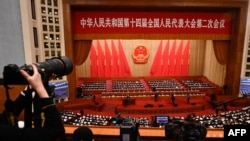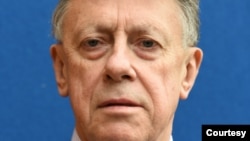Nigel Inkster is the senior adviser for China at the International Institute for Strategic Studies and boasts a three-decade career at the British Secret Intelligence Service, also known as MI6. VOA’s Natalie Liu recently spoke with him about the turmoil among China’s political elite over the past year, most notably the removal of both Defense Minister Li Shangfu and Foreign Minister Qin Gang.
As speculation continues to swirl about the fate of both former officials, Inkster shares his views on the Chinese foreign minister who some reports have suggested was involved in espionage, the potential of coup attempts from within to remove powerful leader Xi Jinping, and the Communist Party’s control of China’s foreign ministry.
The interview is edited for brevity and clarity.
VOA: What makes you think [Foreign Minister] Qin Gang wasn’t involved in espionage?
Inkster: I find it hard to imagine how an intelligence agency would be able to maintain covert contact with somebody not only in such a high-profile position, but also a position where effectively his activities are always subject to oversight by others. If you’re ambassador in the United States, you don’t really have any real latitude to do anything on your own. It’s very difficult, but not impossible.
Internal plot?
VOA: Could the unexplained removal of Defense Minister Li Shangfu, Foreign Minister Qin Gang, among others, have anything to do with plots to remove Xi Jinping?
Inkster: I can’t remember whether it’s [Russian Vladimir] Lenin or [Russian Leon] Trotsky who said: “When an autocrat is in power, his overthrow seems inconceivable, once he’s overthrown, his overthrow seems inevitable.” There’s something to that, of course.
It’s obvious there is, particularly within elements of China’s political elite, unhappiness and pushback with some of Xi Jinping’s policies. There have been intimations that there were plots against the top leadership orchestrated from within elements of the Ministry of Public Security; these things have come up periodically. But my sense is, at the moment — I could be completely wrong about this — but dissatisfaction and opposition to Xi’s policies is fragmented.
General Office of CCP Central Committee
Inkster: And we have to bear in mind that the CCP Central Committee General Office runs a pervasive surveillance operation on China’s top leaders; this office is responsible for organizing the affairs of the top leadership, it also doubles as in effect an intelligence organization that monitors the activities of the top leadership. This is the entity Xi relies upon to be sure he knows what fellow top leaders are doing and thinking. It monitors all their communications, all their movements, so the scope for engaging in this kind of plotting, as I see it, is quite limited.
VOA: If we go back to the Hua Guofeng [who took power after Mao Zedong died in 1976] time, the head of the General Office, Wang Dongxing, led the charge to overthrow the Gang of Four [led by Mao’s widow Jiang Qing], no?
Inkster: Yes, he did. And of course, it’s not impossible [that something like that could happen again], but bear in mind that when that happened, technology was at a far more primitive state than it is now. I’m not saying it can’t happen. There’s precious little that can’t happen. What I’m saying is it is a great deal more difficult than it previously would have been.
The most powerful man inside China’s Foreign Ministry
VOA: The top official listed on the Chinese Foreign Ministry’s website is the chairman of the ministry’s Communist Party committee, a gentleman by the name of Qi Yu who also heads the Party School within the Foreign Ministry. Some Chinese commentators have Qi Yu linked with Xi Jinping, including as a potential relative [on his mother’s side].
Inkster: Under Xi Jinping, we have seen what I would term the partyfication of the Foreign Ministry; you just read his address to China’s ambassadors at the end of last year; he made it abundantly clear that their first loyalty was to be to the party. This is simply a feature of the way things are in China now.
The party is in control of everything, why would it not be in control of the Foreign Ministry? I don’t know if that is the case or not [that Xi has dispatched one of his relatives to watch over the Foreign Ministry], but the simple fact is, obviously, it is in [Xi’s] interest to do everything possible to ensure that the Foreign Ministry does get with the program and enact policy in the way that he wants it to. I don’t find anything at all surprising about that, if it’s indeed what has happened.






